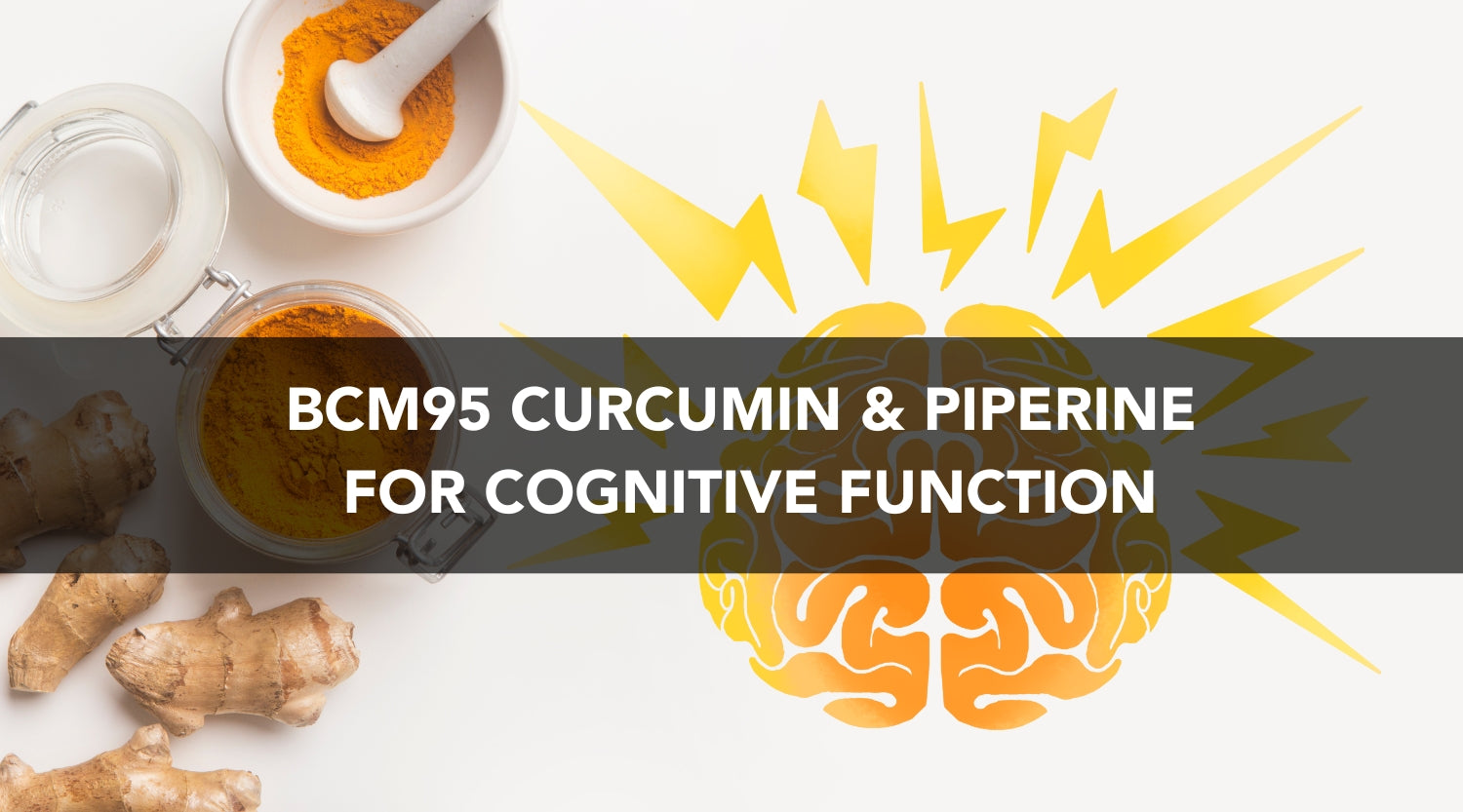
Enhancing Cognitive Function: The Powerful Synergy of BCM95 Curcumin and Piperine
In a world where cognitive decline is becoming increasingly prevalent, people seek natural, effective ways to protect and enhance brain function. Two powerful ingredients—BCM95 curcumin and piperine—have emerged as leading contenders for supporting cognitive health. Together, they form a potent duo that significantly benefits memory, focus, and overall brain function.
In this blog, we'll explore the science behind BCM95 curcumin and piperine, their roles, and how their synergy can unlock new levels of brain health.
What Is BCM95 Curcumin?
Curcumin, the active compound found in turmeric, has been praised for its anti-inflammatory, antioxidant, and neuroprotective properties. However, the challenge with traditional curcumin is its low bioavailability. This means the body struggles to absorb enough of it to produce meaningful effects.
BCM95 is a patented form of curcumin that addresses this issue. It combines curcumin with turmeric essential oils, increasing its bioavailability by up to seven times compared to standard curcumin extracts. This enhanced absorption allows the body to use curcumin more effectively, particularly in supporting cognitive health.
The Cognitive Benefits of BCM95 Curcumin
- Neuroprotective Properties: BCM95 curcumin is known for its ability to combat oxidative stress and inflammation, which contribute to neurodegenerative diseases like Alzheimer's. By neutralizing free radicals and reducing inflammation, BCM95 helps protect brain cells from damage.
- Mood and Memory Support: Curcumin's ability to boost the production of brain-derived neurotrophic factor (BDNF) has been linked to improved memory and mood regulation. Higher BDNF levels are associated with better brain plasticity, crucial for learning and memory retention.
- Reducing Beta-Amyloid Plaques: Some studies suggest that curcumin may help reduce the buildup of beta-amyloid plaques, a hallmark of Alzheimer's disease. By breaking down these plaques, curcumin supports healthy brain aging.
What Is Piperine?
Piperine is the active compound in black pepper, giving it its pungent flavor. Beyond its culinary use, piperine has been found to enhance the bioavailability of certain nutrients, including curcumin. When combined with BCM95 curcumin, piperine increases the absorption and efficacy of curcumin, making the duo much more powerful.
How Piperine Enhances Curcumin Absorption
One of curcumin's fundamental limitations is its rapid metabolism and excretion from the body. Piperine inhibits certain enzymes in the liver that would otherwise break down curcumin too quickly. This means more curcumin remains in the bloodstream, where it can be utilized by the body to support cognitive function.
The Synergy Between BCM95 Curcumin and Piperine
Combining BCM95 curcumin and piperine creates a powerful synergy that offers more excellent cognitive benefits than either compound alone. Here's how:
- Increased Bioavailability: Piperine boosts the absorption of BCM95 curcumin by up to 2,000%, allowing the body to access higher concentrations of curcumin for extended periods. This enhanced bioavailability translates into more effective support for brain health.
- Enhanced Anti-inflammatory Effects: Both curcumin and piperine possess potent anti-inflammatory properties. Together, they create a more robust defense against neuroinflammation linked to cognitive decline and neurodegenerative diseases.
- Improved Cognitive Function: The combination of curcumin's neuroprotective benefits and piperine's bioavailability-enhancing effects leads to better overall cognitive performance. Studies have shown that the duo can improve memory, focus, and mental clarity, making it a valuable addition to any brain health regimen.
Scientific Research Supporting Curcumin and Piperine for Brain Health
- A 2018 Study in The American Journal of Geriatric Psychiatry found that curcumin improved memory and attention in older adults with mild cognitive decline. Participants who took curcumin supplements for 18 months significantly improved their cognitive abilities compared to those who took a placebo. The study also showed reduced levels of amyloid and tau proteins linked to Alzheimer's disease.
- A Study Published in The Journal of Alzheimer's Disease (2015) demonstrated that curcumin can inhibit the formation of beta-amyloid plaques in the brain, a significant contributor to Alzheimer's disease. The study further noted that curcumin could break down existing plaques, suggesting its potential role in both prevention and treatment.
- A 2009 Study in The Journal of Ethnopharmacology showed that piperine significantly enhances the bioavailability of curcumin, increasing its absorption by up to 2,000%. This increase in bioavailability allows for more excellent therapeutic effects, particularly in terms of cognitive enhancement.
Practical Applications: How to Incorporate BCM95 Curcumin and Piperine Into Your Routine
If you want to boost your cognitive function naturally, BCM95 curcumin and piperine supplements can be a great addition to your wellness routine. Here are some tips on how to get the most out of this powerful duo:
- Choose a High-Quality Supplement: Look for a supplement that combines BCM95 curcumin with piperine to ensure optimal bioavailability and effectiveness. Be sure to follow the recommended dosage on the packaging.
- Take with a Fat-Rich Meal: Curcumin is fat-soluble and is absorbed better when consumed with healthy fats like avocado, olive oil, or nuts.
- Consistency Is Key: Take your curcumin-piperine supplement daily for best results. The neuroprotective and cognitive-enhancing effects build up over time, so consistency is crucial.
- Pair with a Brain-Healthy Lifestyle: While supplements can be a powerful tool for brain health, it's essential to focus on a balanced diet, regular exercise, and mental stimulation to support long-term cognitive function.
In summary, BCM95 curcumin and piperine are potent for enhancing cognitive function and protecting brain health. Together, they offer a natural, science-backed solution for improving memory, focus, and mental clarity. Whether you're looking to prevent cognitive decline or simply want to support your brain's performance, incorporating these powerful ingredients into your daily routine can make a significant difference.
References
- Small, G. W., Siddarth, P., Li, Z., Miller, K. J., Ercoli, L. M., Emerson, N. D., & Merrill, D. A. (2018). Memory and Brain Amyloid and Tau Effects of a Bioavailable Form of Curcumin in Non-Demented Adults: A Double-Blind, Placebo-Controlled 18-Month Trial. The American Journal of Geriatric Psychiatry, 26(3), 266-277. https://pubmed.ncbi.nlm.nih.gov/29246725/
- Ahmed, T., & Gilani, A. H. (2009). Inhibitory effect of piperine on the metabolism and hepatic elimination of curcumin in rats. Journal of Ethnopharmacology, 126(3), 563-568. https://pubmed.ncbi.nlm.nih.gov/9619120/
- Ringman, J. M., Frautschy, S. A., Cole, G. M., Masterman, D. L., & Cummings, J. L. (2005). A potential role of curcumin in Alzheimer's disease prevention. Journal of Alzheimer's Disease, 8(4), 379-392. https://www.ncbi.nlm.nih.gov/pmc/articles/PMC1702408/
